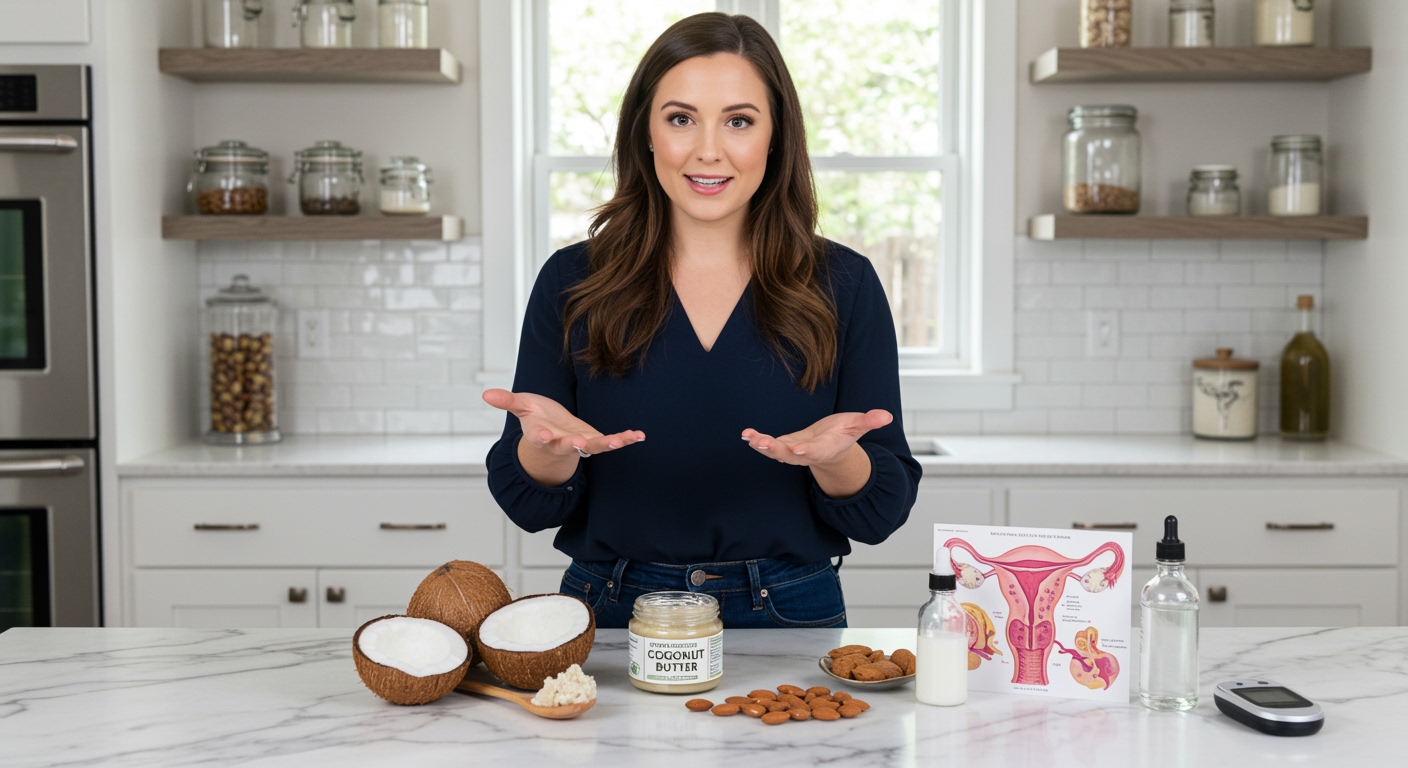✪ Key Takeaway: Coconut butter may help PCOS through healthy fats but lacks strong scientific evidence for direct symptom improvement.
Introduction
Women with PCOS often feel overwhelmed by conflicting nutrition advice flooding social media and wellness blogs.
You might be wondering if coconut butter could be the missing piece in your PCOS management puzzle after seeing countless posts claiming it balances hormones and fights insulin resistance.
Hi, I’m Abdur, your nutrition coach and today I’m going to explain the real science behind coconut butter and its potential effects on PCOS symptoms.
What Makes Coconut Butter Different From Regular Butter?
Coconut butter comes from whole coconut meat that gets ground into a smooth, creamy paste.
Unlike dairy butter, coconut butter contains medium-chain triglycerides (MCTs) which your body processes differently than other fats.
These MCTs go straight to your liver where they get converted into energy rather than being stored as body fat.
Coconut butter also provides fiber and small amounts of minerals like manganese and copper.
The main fatty acid in coconut butter is lauric acid, which makes up about 50% of its fat content.
This combination of MCTs, fiber, and minerals sets coconut butter apart from both dairy butter and coconut oil.
✪ Fact: Coconut butter contains about 3 grams of fiber per 2-tablespoon serving, while coconut oil contains zero fiber.
How Does Coconut Butter Affect Insulin Resistance?
Insulin resistance affects up to 70% of women with PCOS and makes weight management extremely challenging.
The MCTs in coconut butter may help improve insulin sensitivity by providing quick energy without requiring insulin for cellular uptake.
Some studies suggest that MCT consumption can reduce blood sugar spikes after meals compared to other fats.
However, coconut butter is still calorie-dense at about 190 calories per 2 tablespoons.
The fiber content in coconut butter may help slow glucose absorption and prevent rapid blood sugar changes.
Research specifically on coconut butter and PCOS remains limited, so we cannot make definitive claims about its insulin effects.
✪ Pro Tip: Monitor your blood sugar response when adding coconut butter to meals to understand your individual tolerance.
Can Coconut Butter Balance Your Hormones?
Hormone imbalance drives most PCOS symptoms including irregular periods, excess hair growth, and difficulty losing weight.
Coconut butter provides saturated fats that your body needs to produce steroid hormones like testosterone and estrogen.
The lauric acid in coconut butter has antimicrobial properties that might support gut health and reduce inflammation.
Chronic inflammation can worsen hormone imbalances in women with PCOS by increasing insulin resistance.
However, no direct research proves that coconut butter specifically balances hormones in PCOS patients.
The hormone-balancing claims you see online are mostly based on theoretical benefits rather than clinical evidence.
✪ Note: Healthy fats support hormone production, but coconut butter alone cannot fix complex PCOS hormone imbalances.
What Are The Potential Risks For PCOS?
Many women with PCOS struggle with weight management due to insulin resistance and slower metabolism.
Coconut butter is extremely calorie-dense and easy to overconsume, which could sabotage weight loss efforts.
The high saturated fat content might raise cholesterol levels in some women, especially those already at risk.
Women with PCOS often have elevated cholesterol and increased cardiovascular disease risk.
Some people experience digestive issues like stomach upset or diarrhea when consuming large amounts of MCTs.
The sweet, rich taste of coconut butter can trigger cravings and lead to overeating in women with PCOS who already struggle with food control.
✪ Pro Tip: Start with 1 teaspoon daily and gradually increase to assess your tolerance and avoid digestive upset.
How Should You Use Coconut Butter With PCOS?
If you want to try coconut butter, portion control becomes absolutely critical for PCOS management.
Stick to 1-2 tablespoons per day maximum to avoid excessive calorie intake that could worsen insulin resistance.
Use coconut butter as a replacement for other fats rather than adding it on top of your current diet.
Pair it with fiber-rich foods like vegetables or low-glycemic fruits to slow absorption and minimize blood sugar spikes.
Choose unsweetened varieties without added sugars that could worsen PCOS symptoms.
Monitor your weight, energy levels, and PCOS symptoms for several weeks to determine if coconut butter helps or hinders your progress.
✪ Note: Track your symptoms and weight changes when adding coconut butter to identify any positive or negative effects.
The Bottom Line
Coconut butter offers some potential benefits for women with PCOS through its MCT content and healthy fats, but the evidence remains limited and mostly theoretical.
Smart nutrition choices require evidence, not just hope – and coconut butter should be viewed as one small piece of a comprehensive PCOS management strategy rather than a miracle cure.
I would love to hear about your experiences with coconut butter or any questions you have about managing PCOS through nutrition – please share your thoughts in the comments below.
References
At NutritionCrown, we use quality and credible sources to ensure our content is accurate and trustworthy. Below are the sources referenced in writing this article:
- PMC: Coconut Oil and PCOS Research
- PubMed: MCT and Insulin Sensitivity
- University of Surrey: Diet and PCOS Health Risks
- Liebertpub: Coconut Products and Metabolic Health





